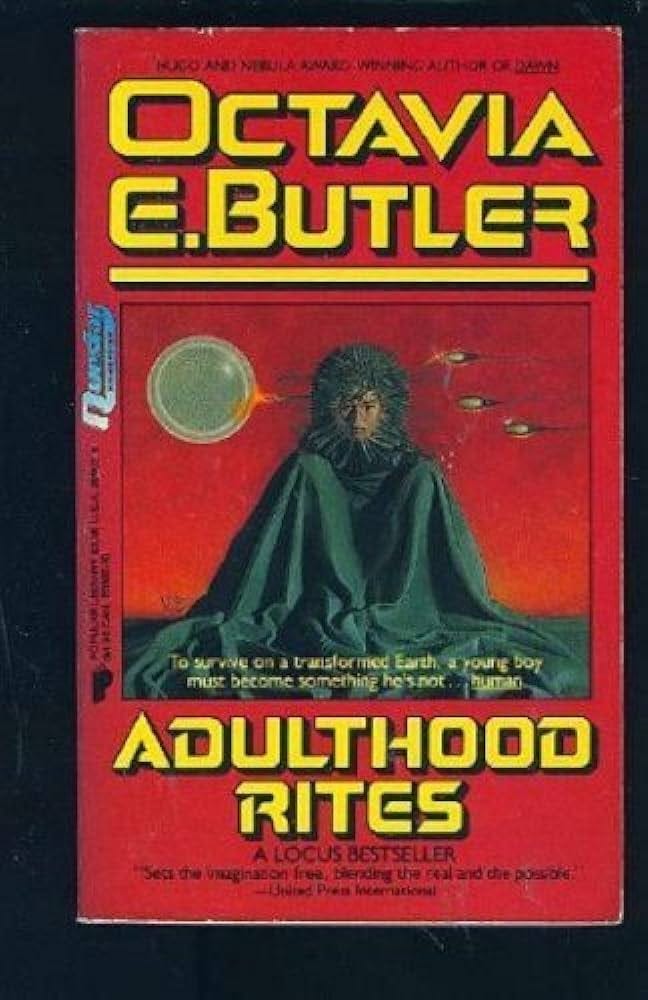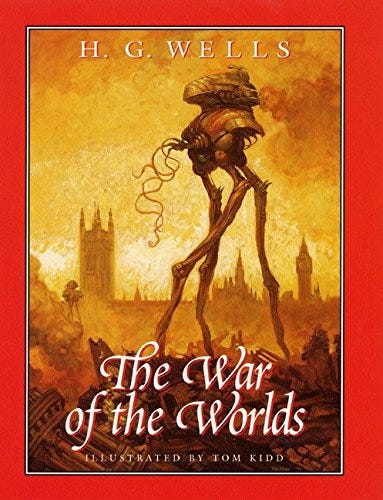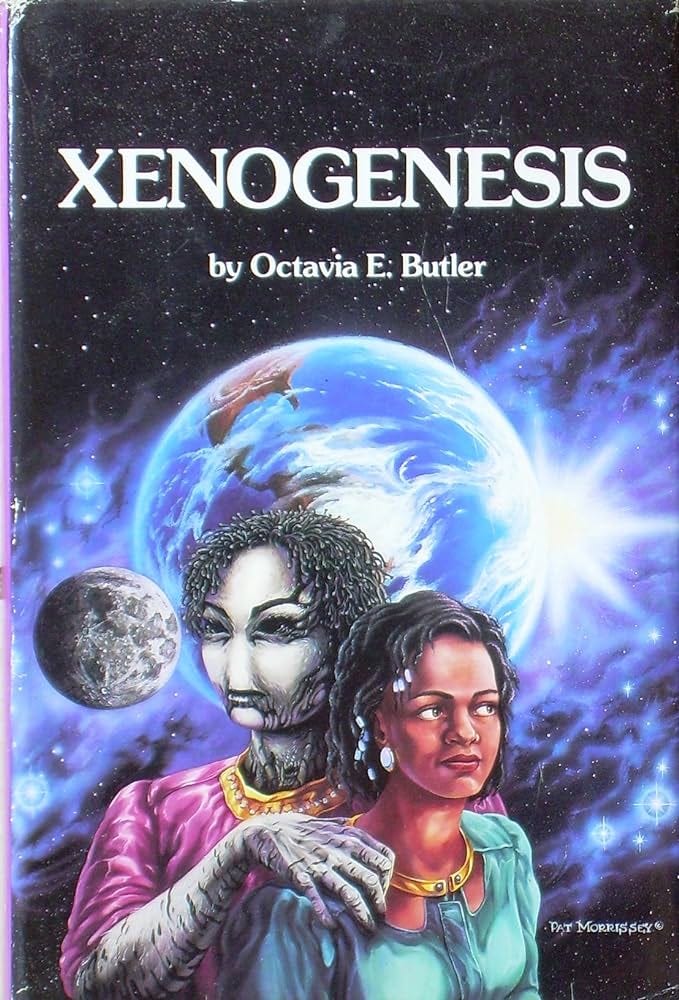I For One Welcome Our Oankali Overlords
In defense of Octavia Butler's tentacled, very human invaders.
Are the Oankali monsters?
In his Modern Masters of science-fiction volume on Octavia Butler, Gerry Canavan says "yes." For Canavan, the tentacled, three-gendered Oankali are imperial exploiters and genocidal racists, determined to exploit and exterminate the human race. Yet, in casting the Oankali as monsters, Canavan unwittingly creates a reading consistent with science-fiction's own history of imperial apology and genocide apology. In doing so, he misses the extent of Butler's engagement with, and undermining of, the binary colonial vision which has long structured science-fiction. When the Oankali are nothing but monsters, Butler is nothing but H.G. Wells—which means that Butler's anti-colonial vision is lost in Canavan's very effort to affirm it.
Bad Oankali! Bad!
As Canavan says, the Oankali certainly do many horrible things. The Xenogenesis trilogy begins after humans have destroyed the earth in a nuclear war. The Oankali rescue the survivors and bring them to a spaceship floating beyond the orbit of the world to heal.
This is not done out of altruism, however. The Oankali are intergalactic genetic "traders"—they travel around the universe, genetically mixing, or mating, with the species they find. Human beings are especially attractive to the Oankali because we develop cancers, which the ooloi, the Oankali third-gender genetic mixers, can use to give Oankali offspring amazing abilities of regeneration and body manipulation.
In pursuing the trade, the Oankali, as Canavan points out, act in many ways as imperial, genocidal exploiters. They keep the rescued humans sedated for hundreds of years, occasionally waking them to study and test them—like lab rats, as the main character, Lilith, notes. They also have sex with humans without their consent, drugging them to make them docile, and using mental and chemical manipulation to make them enjoy it. The novel treats this ambiguously, but, as Canavan says, the ooloi are clearly raping human beings.
Further, the Oankali use genetic manipulation to ensure that, once humans return to earth, they cannot produce children without the ooloi. Only mixed Oankali/human children will be born; no entirely human children are allowed. When the Oankali are finally convinced to let humans breed, they move the human-only colony to the moon—a distant, less desirable reservation. Meanwhile, the Oankali cannibalize earth for their own spaceships in an extreme act of environmental destruction. All of this is justified by eugenic gobbledygook; the Oankali claim that humans are, on a genetic level, hierarchical and intelligent, two traits that lead all human communities to inevitable destruction.
So, to sum up, the Oankali are a race of capitalist, racist, rapists who commit multiple forms of genocide and then consume the earth leaving behind environmental degradation and death. Clearly they are as disgusting as they're terrifying sea-creature/tentacle appearance indicates, right?
The logic makes sense. The problem, though, is that if the Oankali are monsters, that means they are just like H.G. Wells' monstrous, pitiless Martians. In Canavan's reading, Xenogenesis simply recapitulates the invasion in War of the Worlds—and War of the Worlds is not, at its heart, an anticolonial text.
Bad Martians! Bad!
Wells' famous story is based on the mechanism of colonial reversal. War of the Worlds specifically compares the Martian invasion to the European conquest and genocide in Tasmania. The narrator points out that the Europeans can't really judge the Martians, since Europeans act the same way when they invade the colonies. There is some censure of European colonialism here. But there is also a naturalization of it—and an implicit justification. Invader and invaded are different species, locked in a battle without quarter. Martians cannot be reasoned with or lived with. By implication, therefore, Tasmanians cannot be reasoned with or lived with. When the other is a monster, you either exterminate it or it exterminates you. There is no commerce between you.
The War of the Worlds, and latter day imitations like The White Mountains (1967), Red Dawn (1984), Independence Day (1996) or Olympus Has Fallen (2013) are designed to imagine imperial aggressors as victims. "What if they did to us what we did to them?" The result is less a sympathy with the oppressed, than a kind of paranoid fear which cosigns violence in the name of abstract vulnerability. Hitler justified the camps by arguing that the Jews were trying to kill the German people; the South justified slavery in part by fantasizing about the terrors of slave revolts.
Reverse colonial fantasies are an established part of colonial and genocidal logic, because they reinscribe the division between us and them, and insist that that division can only be negotiated through totalizing violence. If Butler's Oankali are in fact monsters, then they are just like Wells' Martians, or Hitler's Jews—paranoid object lessons that the only way to handle conflict is through conquest. The parallel to Nazi Jewish stereotypes is especially fraught, since the Oankali are specifically described as rootless cosmopolitans, intergalactic traders with no homeworld and no genetic identity, who assimilate other cultures as they travel from star system to star system. If the Oankali are monsters, then they're monsters who look uncomfortably akin to anti-Semitic stereotypes.
Good Oankali?
Butler's Oankali are not just monsters, though. They're humans—and not just because they mimic some of the worst traits of humans, as Canavan suggests. Rather the Oankali are human because they are motivated by love, empathy, compassion—and most of all, because they can learn and change.
Canavan says that Butler presents the Oankali as omniscient in the first two books, stacking the deck in their favor. This is a very odd misreading. In fact, the Oankali are fallible throughout the series.
Practically the first thing we learn about the Oankali is that they underestimated and misunderstood Lilith, accidentally driving her insane in isolation, and being forced to return her to suspended animation to heal her. Throughout their interactions with Lilith, they continue to make errors. They think she will want to have sex with a black man basically because the two of them are black. Nikanj, Lillith's ooloi lover, gives Joseph, Lilith's eventual human companion, the power to heal to protect him, but that ends up getting him killed by other suspicious humans. The ooloi are too eager to advance their breeding program, and so rape the humans rather than waiting till they've obtained consent, as Nikanj urges. The Oankali mess up repeatedly, catastrophically, over and over.
But the Oankali also learn from their errors, and try to change. They initially plan to prevent all humans from breeding with each other alone, leading to the end of the pure human race. But in Adulthood Rights, Lilith's son, Akin, both human and Oankali, decides to convince the Oankali to change their minds—and he succeeds. Humanity will go on—both as the humans we're used to, and in the form of tentacular, Oankali humans like Akin.
Some commenters have seen the Oankali as a utopian society, and that's certainly not the case. The Oankali are capable of cruelty, lust, condescension, and great violence—much like humans. Like Wells' Martians, they reproduce the nightmare of colonial violence. But unlike Wells' Martians, the Oankali and humans both offer other possible models for different cultures to come together. Lilith forms a family with Nikanj and other Oankali. Her black children become freedom fighters and super-powered healers. Though Canavan calls the meeting of Oankali and humans genocide, humans are not exterminated, any more than the Oankali are. Both groups change. That change is accomplished with considerable pain, violence, and trauma. But it also involves love, wonder, and new hope.
To say that the Oankali are monsters is to say that humans are monsters—that the only possible options for our species are oppressor and oppressed. That's an idea that Butler flirts with, and more than flirts with, herself, when she says humans are destined to destroy themselves. But the three-gendered, very human Oankali also suggest that humans can, potentially, move beyond binaries. The Oankali are not good, but in joining humans, they are trying to be better. If that's monstrous, the species really is doomed.
I first published this on Patreon in 2017; I have many more readers now so thought I’d re-up it.




